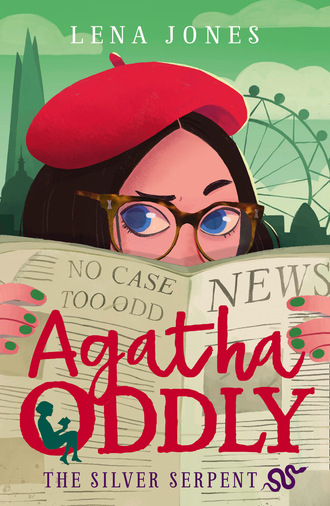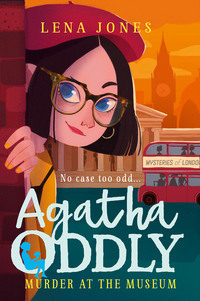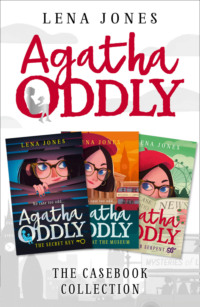
Полная версия
The Silver Serpent
She’s sitting at her carved desk in her wood-panelled office, where everything is plush and ornate. The only clue that we’re underground is the lack of windows.
I sit and she slides a folder across the desk towards me. ‘Your first case for the Gatekeepers’ Guild,’ she says. As I reach to pick it up, there’s another knock at the door … and who should enter but the boy from the National Gallery.
Arthur! My brain struggles to compute. There’s a word, incongruous, which means something that looks completely out of place. This is not his territory, but mine. What on earth is he doing here?
‘Ah!’ says the professor. ‘Arthur – thank you for joining us. Agatha, this is Arthur Fitzwilliam. Arthur, Agatha Oddlow. The two of you will be working on the case together.’
He grins sheepishly at me. ‘Sorry – I looked on your school calendar and found out your class were visiting the gallery yesterday, so I couldn’t resist popping in, in the hope we’d get a chance to meet.’
My brain feels foggy. ‘But … you didn’t say you had anything to do with the Guild!’
‘Not really the place, was it?’ he points out. ‘I couldn’t start blurting out about a top-secret organisation in public.’
The professor looks from me to Arthur and back. ‘Have you two met already?’ she asks, with a frown.
‘Yes,’ I say. ‘Arthur faked a “chance encounter” with me at the National Gallery yesterday afternoon.’
‘I see …’ she says slowly. ‘Arthur, please take a seat.’
As he sits, his face is full of happy mischief.
‘Sorry, Professor D,’ he says. But he’s smiling.
‘That was totally unprofessional conduct,’ she says. ‘It wasn’t fair to Agatha – and it was in blatant breach of Guild rules.’
‘Sorry, Professor,’ he says again. ‘But you told me I was going to be working with Agatha and—’
She holds up a hand to silence him – a gesture I’ve seen too many times directed at me. ‘That will do.’
‘But it’s not like I told her anything!’ he protests.
I can’t help smiling. There was no malice in Arthur’s actions, after all, and I had enjoyed meeting him. I reckon we’ll have fun working together.
The professor shakes her head. ‘I despair, I really do,’ she says. But her eyes are twinkling and the corners of her mouth are twitching.
‘So you knew we were going to be working together?’ I say, turning to Arthur. ‘When we met at the gallery, I mean.’
He nods. ‘The professor told me yesterday morning.’
Professor D’Oliveira shakes her head. She turns to me. ‘So, Agatha,’ she says, ‘you see what you have to deal with … Keep him on a tight leash, won’t you?’ But she’s smiling indulgently, as if he’s a favourite child.
‘I will,’ I promise.
‘This is a sensitive investigation,’ she says, looking from one of us to the other. ‘But I’m sure you’ll make an excellent team. Arthur, who has good art knowledge and more Guild experience, is the lead on this case, but I do expect you, Arthur, to listen to Agatha – she has good instincts and is a natural codebreaker. Right – I think that’s everything for now. I need to get on with my own work.’ She looks at Arthur. ‘Take Agatha to the induction room and bring her up to speed with the case so far, would you?’
‘Certainly, Professor,’ he says. He picks up the folder and the pair of us stand up and move towards the door.
‘Oh,’ she says, ‘just one more thing. Agatha, stay behind a moment, will you? We won’t be long, Arthur.’ Arthur nods and leaves the room, shutting the door behind him.
‘Now, Agatha,’ she says, ‘don’t let this young man take over completely. There’s a case to be solved, and he needs a firm hand at times. He may have been an agent for a couple of years longer than you, but don’t be afraid to contradict him, if you feel it’s required.’
‘OK,’ I say. ‘Thank you for trusting me with this.’
‘You’ve already proven your worth, with the two cases you conducted outside of the Guild. Don’t forget, though – it’s not only Arthur who needs to toe the line. Now you’re working for us, you can’t be going off on your own. There are safeguarding issues at stake here – and I don’t want to have to suspend you again.’
I feel myself flush with embarrassment and frustration. What do I have to do to make her trust me? ‘I won’t – I promise,’ I say, biting back the urge to defend myself.

Arthur is waiting for me outside the office. He nods towards the corridor we need to take to the induction room, and we begin walking side by side. As we pass door after door, part of my mind marvels, as always, at the scale of this underground community.
‘So, you’re Clara Oddlow’s daughter?’ he says.
‘How did you know that?’ I ask.
He shrugs. ‘Common knowledge within the Guild.’
‘Oh.’ I take that in. ‘So, what do you know about her?’
‘Well, she’s a bit of a legend around here, isn’t she? Something to live up to. Must be hard for you, as her daughter.’
‘Well, if I let myself think too hard about it, I’d be paralysed with fears of inadequacy and failure!’ I laugh to show I’m not entirely serious.
‘I believe it’s best not to dwell on the negatives,’ says Arthur. ‘Life’s hard enough at times, without setting yourself up to fail.’
‘That’s exactly what I think!’ We smile at each other. ‘What’s the case?’ I ask him. ‘Professor D’Oliveira said you’re an art expert, so I’m guessing it’s about art?’
‘It is indeed,’ said Arthur. ‘Let’s go in here and then I’ll fill you in.’ He opens the door to the induction room. Unlike the previous times I’ve visited this space, now there are a number of other people sitting at tables, mainly sifting through files. We take seats on the far side, near the radiator. The cold wind doesn’t reach these offices, but it’s still distinctly chilly underground.
I glance around. One man is studying something that looks like a photo, but he’s using his phone to examine it.
‘What’s he doing?’ I whisper to Arthur.
‘It’s a special app. The thing he’s examining is a bit like a microfiche – do you know about those?’
I squeeze my eyes shut for a moment as I summon up my mental filing cabinet and flick through the imaginary, hand-written cards until I reach the right one:
‘A flat piece of film containing microphotographs of the pages of a document,’ I say, reading the text inside my mind.
‘That’s right – tiny images, which you have to view through a special machine that magnifies them. Well, this is a thing called a nanofiche. It was invented by someone at the Guild and can only be viewed using the organisation’s own app.’
‘Wow, that’s cool.’
He points to another person, a woman apparently staring straight ahead of her. The only thing odd about her – apart from this behaviour – is her glasses, which are larger and more clunky than normal. They remind me of the ones an optician uses to test your eyes.
‘She’s watching an information reel,’ Arthur says.
‘She’s actually watching something?’ I say uncertainly. I’m not sure if he’s teasing me.
‘Yep. Those glasses she’s wearing are another Guild invention – the Spectacular. The lenses are really tiny screens.’
‘Wow,’ I say again. Then I lean forward. ‘So, what’s the case?’ I ask again eagerly.
‘Oh, you’ll like this one,’ he says. ‘It’s about the National Gallery.’
‘Seriously?’
‘I’m always serious about art,’ he says. I look at this boy – with his floppy blond hair and dimples – and can’t imagine he’s ever serious about anything.
He draws a sheet of paper from the folder the professor gave us.
‘This is Dr Elizabeth MacDonald, the director of the National Gallery,’ he says, showing me a newspaper clipping of a woman standing in front of Sunflowers. She’s an elderly lady, in a tweed skirt-suit with loafers and is dwarfed by the large canvas. Her white hair is pinned back in a neat bun. She resembles a kindly nanny from a children’s book far more than the director of one of the most famous art galleries in the world.
‘OK …’ I say, scanning her clothing, her stance and her expression. I don’t believe you can work out much about a person from a photograph – especially a posed one, when they’re on their guard – but a person’s choice of dress says a little about how they want to be seen. And how a person desires to be viewed offers certain hints regarding the way they feel about themselves. Elizabeth MacDonald, I decide, is clearly secure enough in her knowledge and experience of the art world not to feel the need to resort to designer clothing or outrageous dress, in order to make her mark.
He draws another sheet from the file: a square photograph.
‘And this is Sheila Smith, the senior curator.’ The picture shows a woman with wavy blonde hair and bright-red lipstick. He places a one-page document below the image. ‘And this is the report on her disappearance.’
I look up sharply. This is the first time he’s lost his jovial tone and seems genuinely grave. ‘Disappearance?’
‘That’s right. She was reported missing yesterday morning, by Dr MacDonald – although it seems that no one’s seen her since Friday night, when she failed to board a flight.’
I take a moment to process this. ‘How long have you been working on this case then?’
‘I’d only just started when I met you at the Van Gogh yesterday. I’d come straight from a meeting with Dr MacDonald. In fact, I had thought I’d be teamed up with Sofia. Between ourselves, I was quite relieved when she had to fill in for someone who’s off sick. She’s a bit … uptight, if you know what I mean?’
I laugh. ‘So, where was Sheila meant to be going?’
He draws out a notebook from his rear trouser pocket and consults his notes. ‘Colombia,’ he replies, ‘to view a painting that’s just come on the market. The National Gallery’s interested in buying it. It was the art dealer over there, in Bogotá, who called Dr MacDonald on Monday morning, to say Sheila had never arrived.’
‘Has anyone checked if she boarded the plane?’
He nods. ‘Dr MacDonald made enquiries with the airport. It was a late-night flight – eleven o’clock – but Sheila never checked in.’
‘What about her family?’
‘They haven’t heard from her.’
‘Why didn’t someone just call the police?’ I ask. ‘It sounds like a straightforward missing person’s case.’
‘Ah. The police aren’t convinced there’s “foul play” involved. They say Ms Smith is perfectly within her rights to take off without notifying anyone. They did have a quick check of her flat, and there was no sign of a struggle. Also, her passport’s missing, so she could have gone anywhere – by ferry, if not by plane. They said they’re happy to hand it over to a private investigator for now, which is why Dr MacDonald contacted us. There’s an agreement that we must tell the police if we turn up anything serious. And they said they’ll have to intervene if we haven’t found her by Friday evening.’
‘We need to get a move on then,’ I say. ‘What else is in that folder?’
‘Not much – it’s waiting to be filled. Oh – I’m meant to give you this.’ He hands me a fake ID badge, with my name beneath my photo and a company name.
‘Who are Prodigal Investigations?’ I ask.
‘That’s our undercover employer, while we’re working this case. It avoids awkward questions about the Guild. The story goes that we’ve been recruited by a PI agency that specialises in hiring promising young people. It’s just to show to anyone who asks too many questions.’
‘Fair enough,’ I say and stash the badge in the outside pocket of my backpack.
He skims through his notes. ‘What I found out from my tête-à-tête with Dr MacDonald was that she’s approaching retirement, and that she’s from an old Scottish clan who own lots of land. They even have an island! It’s called the Isle of Fairhaven. She’s planning on going to live there when she retires from the gallery.’ He puts on a pretty convincing old lady’s voice – complete with Scottish accent – and says, ‘I’m going to pass the autumn of my years on the Isle of Fairhaven.’
I laugh. ‘Is that what she sounds like?’
‘It is, and that’s what she said, verbatim, when I interviewed her yesterday.’ He slips back into Scots mode. ‘She’s such a dear, wee little thing.’ If I’m honest, part of me is a bit uncomfortable about his mockery of Dr MacDonald (I’ve been on the receiving end of too much teasing myself) but I can’t help laughing again – he’s too funny.
‘Her own island,’ I murmur. I picture the tiny plot of land in the Serpentine, to which I’ve rowed from time to time, and wonder how big the MacDonald clan’s isle might be.
‘So where do you think we should start?’ he asks me.
I’m flattered that Arthur thinks enough of me to ask my opinion, when he’s clearly the more experienced agent. I do a mental run-through of important early procedures, from a book I’ve read five times: Complete Crime Scene Investigation Handbook. It tells you that one of the first things is to think of the obvious, and so I say, ‘Have you been to Sheila’s home yet, to search for clues?’
He shakes his head. ‘No. I haven’t really started yet.’
I draw Sheila’s photo close for a good look. She’s probably in her early fifties, dressed in a trouser suit, with one hand in her trouser pocket. With her glossy, blonde, shoulder-length hair, she has a vintage-film-star quality, like Greta Garbo or Rita Hayworth.
‘When was Sheila last seen?’ I ask him. ‘I mean, I know it was Friday night, but what time and where?’
‘At work. She got her coat at five thirty and said goodbye to all the staff. Apparently, she prides herself on knowing the names of all her colleagues, on both the art history and art maintenance sides.’
I like the sound of Sheila.
‘And did anyone witness her leaving through the main entrance?’
He consults his notebook. ‘No. The person on reception was busy with a tour group, so nobody actually saw her go.’
‘So she might have been kidnapped directly from the gallery.’
‘Or she might even still be there,’ he suggests. ‘Either hiding, for some reason, or tied up by an assailant.’
This sounds unlikely to me. ‘Surely someone would have come across her by now, if she was being kept hostage in the building.’
‘A good investigator doesn’t rule anything out,’ he says.
‘True. So we need to check the security cameras to make sure she did leave, and see what time it was.’
‘Good idea.’
I Change Channel and summon up a view of the National Gallery, with its roof removed, as if I’m floating above it. If I was Sheila Smith and I wanted to hide here, where would I go? And if I was her assailant, where would I put her, alive or dead?
It takes me a moment to realise Arthur is speaking to me. ‘Hello? Earth calling Agatha …’
‘Sorry!’
‘Where did you go?’ he asks.
I blush. ‘I just switched off this room inside my head and shone a light inside the gallery building.’
Most of the time, people look at me politely or with mild concern when I explain my Change-Channel mechanism. Not Arthur, though. ‘Oh – I do that!’ he says enthusiastically. ‘I call it Auto-Focusing!’
‘Changing Channel!’ I say. I catch his eye and we laugh.
‘I guess the Guild attracts a certain brand of weirdo,’ he says.
‘I prefer “maverick”,’ I say. ‘You know – someone who’s happy to do things their own way.’
He grins. ‘OK. Maverick it is. Let the investigation begin!’
Конец ознакомительного фрагмента.
Текст предоставлен ООО «ЛитРес».
Прочитайте эту книгу целиком, купив полную легальную версию на ЛитРес.
Безопасно оплатить книгу можно банковской картой Visa, MasterCard, Maestro, со счета мобильного телефона, с платежного терминала, в салоне МТС или Связной, через PayPal, WebMoney, Яндекс.Деньги, QIWI Кошелек, бонусными картами или другим удобным Вам способом.



